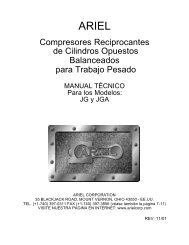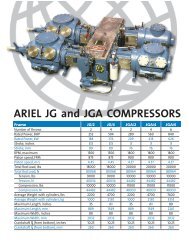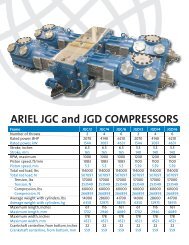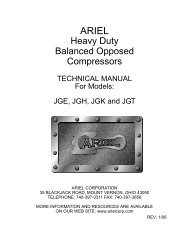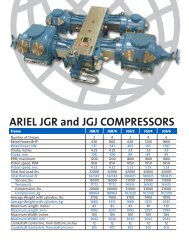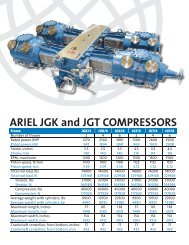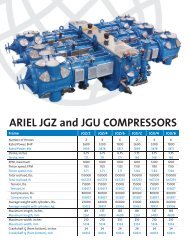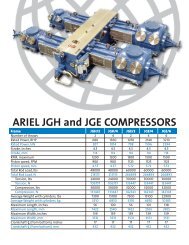Heavy Duty Balanced Opposed Compressors
Heavy Duty Balanced Opposed Compressors
Heavy Duty Balanced Opposed Compressors
You also want an ePaper? Increase the reach of your titles
YUMPU automatically turns print PDFs into web optimized ePapers that Google loves.
FOR MODELS: JG AND JGA SECTION 4 - LUBRICATION AND VENTING<br />
Compressor frame lubricating oil should be changed at regular maintenance intervals (6<br />
months or 4,000 hours), when oil filter differential pressure exceeds 10 psi (0.7 bar) or when<br />
oil sample results indicate the need. A more frequent oil change interval may be required if<br />
operating in an extremely dirty environment or if the oil supplier recommends it.<br />
Oil sampling should be performed on a regular basis to verify suitability of oil for continued<br />
service. Degradation to the next lower viscosity grade below the original viscosity or an<br />
increase in viscosity to the next higher grade requires a complete oil change. Viscosity testing<br />
should be performed at 212°F (100°C).<br />
Cylinder And Packing Lubrication Requirements<br />
Cylinder lubrication requirements will vary with the operating conditions and the composition<br />
of the gas to be compressed. Careful consideration must be given to proper cylinder lubrication<br />
selection. The degree of cylinder oil lubrication dilution/saturation by the process gas<br />
stream is influenced by the following factors:<br />
1. Process gas composition/Specific Gravity (SG) - usually the higher the SG, the<br />
greater the oil dilution.<br />
2 Discharge gas pressure - the higher the pressure, the greater the oil dilution.<br />
3 Discharge gas temperature - the higher the cylinder discharge temperature, the<br />
less the oil dilution.<br />
4 Lubricant selection - some types of oil are more prone to dilution than others.<br />
Please refer to Table 4-1 on page 4-8 for lubrication recommendations for various gas compositions<br />
and various operating conditions. Note that lubrication rates can change with operating<br />
conditions. Lubricating oil type will also vary with the composition of the gas which is to<br />
be compressed.<br />
Common Oil Supply - When process gas composition and cylinder operating conditions<br />
allow compressor frame lubricating oil to be used for cylinder and packing lubrication, the<br />
resulting force feed lube systems are installed as shown in Figure 4-8: on page 4-18.<br />
Independent Oil Supply - When process gas composition and cylinder operating conditions<br />
require an independent cylinder oil supply, the resulting separate force feed lube systems<br />
require an oil supply as shown in Figure 4-9: on page 4-20. Lubricator oil is supplied under<br />
pressure from an elevated tank. To ensure that the compressor frame oil is not contaminated,<br />
be sure that the force feed lubricator box over flow does not drain into the crankcase.<br />
This over flow tubing must be disconnected from the compressor frame and directed to an<br />
appropriate drain system.<br />
Independent force feed lube systems require oil with a viscosity below 5000 SUS (1100 cSt)<br />
at the lubricator pump inlet. Measures which may be necessary to make sure that the force<br />
feed pump is filled with oil during the suction stroke include; appropriate pipe and fitting size<br />
from the tank to the force feed pump, heating the oil, and pressurizing the supply tank. An inline<br />
oil filter or fine screen is required between the supply tank and the force feed lubricator<br />
pumps. Recommended filtration is 20 micron nominal.<br />
Inadequate (under) lubrication results in a “mini-lube” condition. This condition results in<br />
extremely rapid breakdown of Teflon and PEEK piston and packing ring materials. Black,<br />
11/01 PAGE 4 - 5



